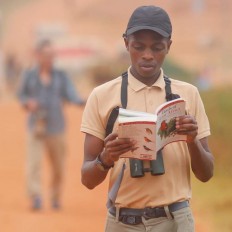Coordinates were set by
Roger Irakoze
:
-1.5294/29.6635
(2023-05-09 10:47:59
)
Site name was set by
Roger Irakoze
as
"Mukungwa"
(2023-05-09 10:47:59
)
Mukungwa is a river which get its origin from the twin lakes (burera and ruhondo) in the northern province of Rwanda. the river flows in the southern province where it finally flow in Nyabarongo river.
the terrain here is composed by open farmlands and small forests in the mountains around. the vegetation of the area is swamp vegetation which gives a chance to spot many waterbirds, wading birds, perching birds, tropical and migratory birds.
large scale of the land here is owned by the local communities who live around the river and they use it for agriculture.
Birdwatching in this area is very important as it is a tourism activity which generates income to the local guides and the government in general through taxes, and it's a tool to encourage the local communities to participate in the conservation of birds and their habitat because when they see tourists traveling in their area because of birds, they get the attention of preserving the birds and their habitats.




